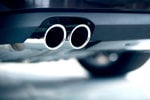Review
But as the second generation of vehicles from the joint venture roll off the production line at the Portuguese factory, a push for more individual products is taking place.
The latest and most striking of the two launched so far (SEAT is launching its version later this year) is the Ford Galaxy, which may share many parts with the Volkswagen Sharan launched earlier this year, but benefits from Ford's 'new-edge' front-end styling, which has already graced the Focus, Ka and Cougar. The front-end image is set off by clear glass headlamps, which include a striking arrangement that has a new xenon lamp included, which helps the car stand out in the company car park and on the road.
Climbing into the driver's seat, the dashboard shows why the proximity sensors front and rear are vital as figuring out where the front of the Galaxy is can be down to guesswork until you get used to predicting how far its steeply raked bonnet reaches.
In this sector, passenger comfort is all important and while legroom in the second row of seats is ample, third row passengers will find there is not much room to stretch out. A seven-seat configuration is offered as standard, with six-seats available as an option, but the five-seat variant available in the current model has been dropped as it resulted in poor residual values, a sign of the key impact RV conscious fleets have had.
During the launch test drive of pre-production models in Paris, the improved 2.3-litre engine provided impressive flexibility, smoothness and refinement. Although the four-speed auto box option tended to sap power, the semi-automatic model helped provide a more 'sporty' feel.
My overall impression was that the diesels were the pick of the crop, particularly the 90bhp version, which, although slower than its 115bhp stablemate, was smoother and less raucous at higher revs.
Handling has been uprated on the new Galaxy, although I found that sharp corners still produced pronounced body roll. However, press-on driving with a family on board is unlikely to spring to most drivers' minds, particularly if the rear seat passengers are focused on TV screens in the rear of the front seats. Passengers wanting to keep their eye on the TV will also be helped by the supple suspension, which soaks up the bumps and provides a smooth ride.
User-choosers are expected to be the main market for the new Galaxy and an important factor in their choice will have to be price, which Ford promises will be competitive, so customers can expect to see them pegged somewhere between £18,000 and £25,000.
The current model has been the best-selling car in its class since 1996 and notched up 13,613 sales during 1999, with between 70% and 80% going to fleet customers. With such dominance of the market, Ford is not expecting sales of the new Galaxy to rocket, but is predicting a slight increase on current demand.
When the Galaxy goes on sale, with a predicted launch date of August 1, it will be powered by updated versions of the Ford 2.3-litre and Volkswagen 2.8 V6 petrol engines. The 24-valve V6 offers 17% more power than its predecessor and has cut the 0-62mph time to 9.9 seconds from over 11 seconds.
Ford will also be introducing its first ever use of high-pressure direct injection diesel technology in any UK model with two new engines from Volkswagen. Two 1.9-litre Pumpe duse engines, producing nearly 90bhp and 115bhp respectively, will replace the current turbodiesel engines supplied by Volkswagen, offering improved refinement, performance and economy.
Another first for Ford, supplied again through its alliance with Volkswagen, is a six-speed gearbox which will be standard on both the V6 and both diesels, while a five-speed automatic is an option on the V6 and more powerful diesel. The improved 2.3-litre engine will feature a five-speed manual and four-speed automatic plus a sequential semi-automatic option for the first time.
All engines are offered with 10,000 mile service intervals and the 2.3-litre petrol is expected to be the best seller, with a 48% share of sales last year, although under the CO2-based company car tax regime, the driver of the manual version would pay tax on 30% of the car's list price in 2002/2003, rising to 34% in 2004/2005. In contrast, both diesel drivers would pay tax on 20% of list price, rising to 24% by 2004/2005.
Inside, the individuality of the front has been carried through to the passenger compartment, with a new-style steering wheel, centre console and instruments providing a car-like environment. Another first for the new Galaxy is a hi-tech entertainment unit for rear seat passengers, which offers video, games console and will eventually also include a DVD player, projecting through screens in the back of the front seats, which 4% of buyers are expected to opt for. A satellite navigation system will also be an option.
Equipment levels at X, Zetec and Ghia have yet to be finalised but the Galaxy will claim another first in class by offering standard ABS and dual airbags across the range, along with air conditioning, while additional features such as side-airbags, electronic stability programme and proximity meters at the front and rear of the car are also offered. Fleet customers played a vital role in upgrading the new Galaxy and their comments have been taken into account when developing the new model.
Existing Ford Galaxy customers, the majority of which are fleet drivers, came together to create customer panels, a European first for Ford, with 15 drivers in Germany and 15 in Britain.
Andrew Politt, Galaxy chief programme engineer, said: 'These vehicles are viewed as luxury saloons first and foremost and that gave us real confidence to press ahead with an interior worthy of a premium executive car and top-of-the-range features and options.'
Ford will be providing 200 demonstrators to key fleet customers to ensure it retains its position at the top of the MPV sales charts. Test models will be provided to customers during July, although major fleets, including BT, have already been given a preview of the car, along with residual value experts CAP Motor Research and Glass's Guide Information Services.
Ian McAllister, chairman and managing director of Ford of Britain, said: 'We are hoping to maximise the retail share as well as retaining fleet customers. User-chooser customers are very important to us. With the current Galaxy, we actually had more demand than we could meet. There has been pent-up demand as we reach run-out of the current model.'















